Following ESA-sponsored medical doctor Adrianos Golemis on his travels to Concordia this blog entry recounts his first weeks on the Antarctic base last November.
Concord Dawn was a fictional world that I remember from childhood as I feasted my eyes upon the milky vastness of Dome Circe. The name, similar to the Station I was heading for, was quite fitting as a word play on the dawn of a new life that awaited me at Concordia. An arid, sparsely populated world, Concord Dawn’s fictional location was not that far from the reality that manifested before my eyes. Staying in reality rather than indulging my imagination again, here is a song from a New Zealand band called Concord Dawn. The sound is electronic with an apt theme for the polar regions that we had just entered: Aurora.
[youtube NK8oxz7IU_Q]
As the Bassler plane touched down at Dome Circe, I was surprised by the smooth landing on the frozen surface. Clad in polar wear, we rushed out of the hull and into the base entrance. It was an odd feeling to finally step on this most remote structure for which I had read and written about many times.
Stepping out of the plane, I was reunited with my compatriot and veteran ESA Doctor, Evangelos Kaimakamis. In a funny, almost theatrical way, the words of a more historical, meeting came in my mind. I could easily have said “Dr. Kaimakamis, I presume?” echoing Stanley meeting Livingstone in the heart of Africa. Instead, we exchanged more casual and hearty greetings, as you will see.
Last year’s crew helped us into the base by carrying our luggage. The hypoxia at Dome Circe is a threat to your health if you do not follow medical advice. You have to minimise physical activity, rest and sleep a lot for the first two to three days until you partially acclimatise, otherwise you could face severe symptoms such as pulmonary or cerebral oedema. But these are rare cases. We all suffered from shortage of breath that still persists today when we climb the many stairs of the Station, and of course, the headaches! My sleep was disturbed these first weeks, I would always wake up after 4 or 5 hours and found myself incapable of resting more. Over time my sleep was restored to normal and I am proud to say that I can now sleep seven hours straight! Quality of sleep is a different matter however: most of us experience a lot of apnoeas (pauses in breathing) during sleep, the result of high altitude and hypoxia. Coupled with the extreme dryness and constant light, it is not uncommon to wake up many times throughout the night – this is not really expected to improve much. My dreams are always intense here, regardless of whether they are nightmares or more pleasant dreams.
Evangelos and I lived together for almost 10 days in room 14 of Concordia Station. Among other things he trained me in the medical experiments that I would have to perform, but we also discussed about a lot of other matters, ranging from space exploration to theatre.
It was a pleasure to converse in Greek on top of English and French –I hope to learn some Italian before the year is out! But the time came for Evangelos’ repatriation; in just over a week gooddays turned into goodbyes.
The same plane that transported Evangelos home after his long stay in Antarctica brought two new colleagues at the Station. I would share the room with one of them and the ESA laboratory with the other. When the plane arrived, I followed the departing crew to the frozen runway for the last farewell.
I felt the completeness in the change of roles as I walked Evangelos to the DC3 Dakota plane that was to take him to the Antarctic coast, the start of a long journey back to our dear old Europe and Greece. As I returned back to the base alone, I perceived for the first time the status transition. From a guest and novice on Concordia Base, I was now taking my first steps on my own, as one of the 13 winter wardens of the Station. In spite of the exhaustion, having slept no more than five hours every day since my arrival, I felt deep awareness: I felt alive.
Next week I would rearrange and clean the ESA laboratory at Concordia, my workspace to conduct medical research. Fixing your first-ever professional office is a cool task to do, even if it lies as far away as Antarctica!
Winter supplies began to arrive on the following aircraft and we went outside to help with unloading several times. I had been outside the base only twice these last 12 days, total “EVA” time around 2.5 hours. So this third time out really felt like something, it was very refreshing. Although we finished the job of unpacking the goods in less than 20 minutes, I went on to take a small walk on the snow. I actually enjoyed the bad weather. It really felt like an Antarctic adventure and I marveled at the early explorers who made it to the Pole with far inferior clothing, equipment and communications to ours today. I hope that when they watch down on Earth from their eternal palaces among the stars, they will be happy knowing that humanity is slowly taming the wilderness of Antarctica, without weapons, conquests, or wars, but with mutual understanding, cooperation and care for tomorrow. This is the very essence of our international Station, Concordia.
A few more peculiarities add to the Concordia experience: The extreme dryness causes lots of static electricity, resulting in multiple little shocks per day when you touch metallic door handles. Computers are very sensitive to static electricity too, so you always have to discharge yourself before you touch one, especially if you are wearing plastic shoes!
A new tradition developed this December is going for Sunday walks. A few of the crew would set out in the afternoon for a long walk often up to 20 kilometers. This is great exercise and a hard endurance test, but you can bask with joy and self-assertion when you finish.
Throughout the summer, we all enjoy the shine of a million sunrays dancing in the air among playful ice crystals. This is the source of an interesting phenomenon called ‘Phantom Sun’ or ‘Sun Dogs’, which we hope to witness again and photograph. Diffracted sunlight from ice crystals in the air creates two false images of the sun that rise together with it. In some cases, a full halo can be observed.
My first night at Concordia was full of expectations – and some fear. I was definitely stepping out of my comfort zone, and now that I was finally here I was elated – at the same time the old concern over a year of isolation were revived in my heart.
With this I recalled in my thought the events of this unique day, 9 November: how we entered Dome Circe, landed on the ice, met our crew mates and had a tour of the base. In particular Evangelos’ welcoming words were imprinted vividly in my memory.
– “Κανένας Έλληνας εδώ πέρα; / Anyone from Greece here among you?” he asked humorously as ten indistinguishable people in blue and red uniforms with masks descended from the plane.
– “Για την ακρίβεια, ναι! / Yes, indeed!” I answered happily. We embraced each other, unable to believe we had met after two years in the most unlikely of places, at the other end of the Earth.
Exhausted by travelling, lack of sleep and hypoxia, I still went to bed with a broad smile that night, content in the thought that this might have been the first dialogue muttered in Greek in the very heart of the Antarctic world. ҉

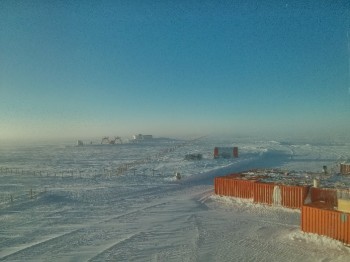
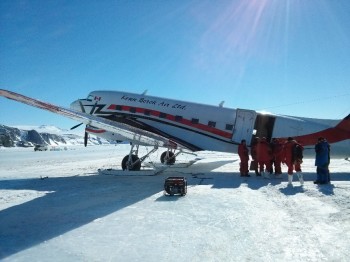
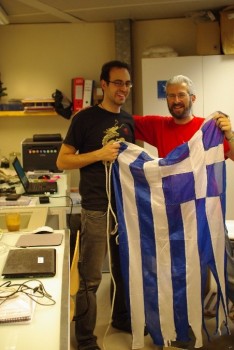
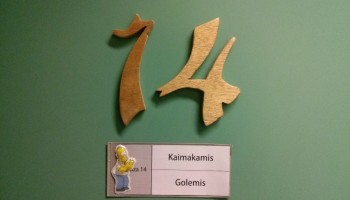
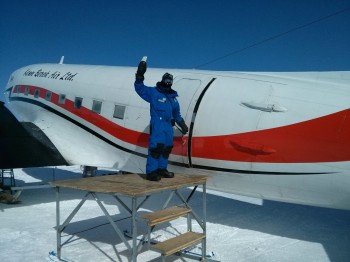
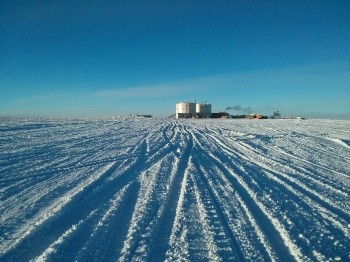



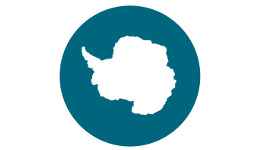
Discussion: 2 comments
Με τη βοήθεια του Google Translate …
Είθε να απολαύσετε ενδιαφέρουσα και ικανοποιητική φορές. Σας ευχαριστούμε για το γράψιμο.
Jim στην Αϊόβα στις ΗΠΑ
Thank you very much for this great comment in Greek!
Ελπίζω ότι μπορείτε επίσης να απολαύσετε τη ζωή στην Αϊόβα και να έχετε την ευκαιρία να επισκεφθείτε ένα ελληνικό νησί το επόμενο καλοκαίρι!
“Warm” greetings from the ice,
Adrianos.